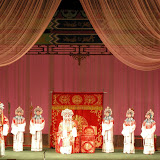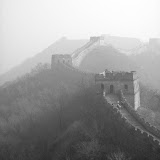中午偷闲到太子大厦的一家书店转转,在满架有关美国总统竞选的书中看到美国前副总统戈尔写的新书 The Assault on Reason。撇开书中对美国政治的分析和对现政府的抨击不谈,有个类比觉得有意思。他说恐惧、理性和信仰的关系就像儿时玩的游戏石头、剪子、布,恐惧破坏理性思维,理性挑战信仰的真实,而信仰征服恐惧心理。
说起石头、剪子、布,还很有几分亲切感,小时候最常用这个来决 定某项优先权。无论你出石头、剪子还是布,都有可能赢,结果取决于对方出什么。玩儿着玩儿着,发现还有心理战术,可以根据上一局双方的出招猜测这一局对方最有可能出什么。 后来发现外地小孩儿也玩,然后发现外国人也玩儿。后来在商学院教授解释博奕论的时候,我又想起了这个童年的游戏。
定某项优先权。无论你出石头、剪子还是布,都有可能赢,结果取决于对方出什么。玩儿着玩儿着,发现还有心理战术,可以根据上一局双方的出招猜测这一局对方最有可能出什么。 后来发现外地小孩儿也玩,然后发现外国人也玩儿。后来在商学院教授解释博奕论的时候,我又想起了这个童年的游戏。
我觉得这个游戏深具中国文化特色,甚至猜测它起源于中国,也确实听说在十九世纪的欧洲作品中提到它时候称之为“一种亚洲的游戏”。中国文化对各种力量之间彼此作用角逐最终达到平衡和谐的独特理解在这个游戏中颇得体现。传统的中国文化似乎不太看重逻辑思维,所以也就不受A比B强,B比C强,所以A一定比C强这种逻辑的限制,灵活而通融。传统的中国人深谙一物降一物的道理,所以再强也懂得收敛。在中国经济飞速发展财富骤增的今天,在有些人开始忘乎所以忘了天高地厚在巴黎的名牌店里挺着大肚子颐指气使的今天,希望我们还能记起儿时玩过的这个石头、剪子、布的游戏。
Rock, Paper, Scissors
I snatched a moment during lunch break at a bookshop and browsed through a new book written by Al Gore titled The Assault on Reason. One analogy he made reminded me of a childhood game. He said, the relation among fear, reason and faith is similar to that of rock, scissors and paper. Fear displaces reason, reason challenges faith, and faith overcomes fear.
The game “rock, paper, scissors” touched the reminiscences of my younger days, when we used the game for all kinds of random selections. Rock, paper and scissors all had a chance to win, depending on what gesture the opponent decided to make. Having played more, I found the result was not always random because after a few rounds the opponent’s pattern of behaviour could be exploited. Later I found kids from other cities also played the same game, so did kids from other countries. Years later, it reappeared in my mind when I was sitting in the lecture on Game Theory at my business school.
 定某项优先权。无论你出石头、剪子还是布,都有可能赢,结果取决于对方出什么。玩儿着玩儿着,发现还有心理战术,可以根据上一局双方的出招猜测这一局对方最有可能出什么。 后来发现外地小孩儿也玩,然后发现外国人也玩儿。后来在商学院教授解释博奕论的时候,我又想起了这个童年的游戏。
定某项优先权。无论你出石头、剪子还是布,都有可能赢,结果取决于对方出什么。玩儿着玩儿着,发现还有心理战术,可以根据上一局双方的出招猜测这一局对方最有可能出什么。 后来发现外地小孩儿也玩,然后发现外国人也玩儿。后来在商学院教授解释博奕论的时候,我又想起了这个童年的游戏。我觉得这个游戏深具中国文化特色,甚至猜测它起源于中国,也确实听说在十九世纪的欧洲作品中提到它时候称之为“一种亚洲的游戏”。中国文化对各种力量之间彼此作用角逐最终达到平衡和谐的独特理解在这个游戏中颇得体现。传统的中国文化似乎不太看重逻辑思维,所以也就不受A比B强,B比C强,所以A一定比C强这种逻辑的限制,灵活而通融。传统的中国人深谙一物降一物的道理,所以再强也懂得收敛。在中国经济飞速发展财富骤增的今天,在有些人开始忘乎所以忘了天高地厚在巴黎的名牌店里挺着大肚子颐指气使的今天,希望我们还能记起儿时玩过的这个石头、剪子、布的游戏。
Rock, Paper, Scissors
I snatched a moment during lunch break at a bookshop and browsed through a new book written by Al Gore titled The Assault on Reason. One analogy he made reminded me of a childhood game. He said, the relation among fear, reason and faith is similar to that of rock, scissors and paper. Fear displaces reason, reason challenges faith, and faith overcomes fear.
The game “rock, paper, scissors” touched the reminiscences of my younger days, when we used the game for all kinds of random selections. Rock, paper and scissors all had a chance to win, depending on what gesture the opponent decided to make. Having played more, I found the result was not always random because after a few rounds the opponent’s pattern of behaviour could be exploited. Later I found kids from other cities also played the same game, so did kids from other countries. Years later, it reappeared in my mind when I was sitting in the lecture on Game Theory at my business school.
Although played world-wide, this game exhibits a strong flavour of Chinese culture. I even suspect that it originated in China. Did I hear that it was labelled “an Asian game” in the works of European authors from the 19th century? The unique interpretation of rivalry and interaction among various forces and the hope for these forces to enter into a final state of balance and harmony form an important aspect of Chinese culture, quite vividly expressed in this game. It appears that traditional Chinese culture does not emphasis logic thinking, and is beneficially not restrained by the logic such as: A is stronger than B, B is stronger than C, and therefore A must be stronger than C. A traditional Chinese man understands too well that anybody has a natural enemy and can be vanquished; however strong, he always behaves modest and mild. At a time when China is experiencing brisk economic growth and fast accumulation of wealth, and at a time when some people get swollen-headed, forget the height of the heaven and the depth of the earth, I hope we can still remember this game everybody has played in his childhood. Rock defeats scissors, scissors defeat paper, but paper defeats rock.













